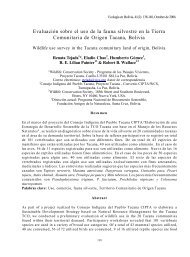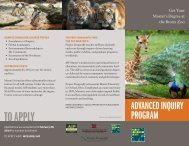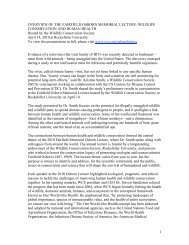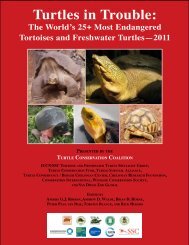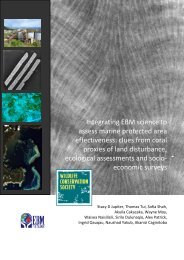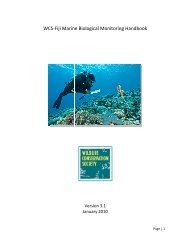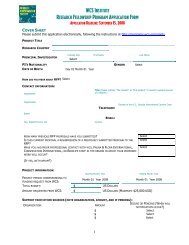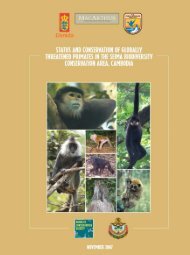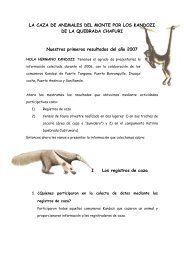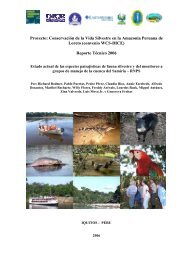WCS Annual Report 2012 - Wildlife Conservation Society
WCS Annual Report 2012 - Wildlife Conservation Society
WCS Annual Report 2012 - Wildlife Conservation Society
Create successful ePaper yourself
Turn your PDF publications into a flip-book with our unique Google optimized e-Paper software.
40<br />
wildlife conservation society <strong>Annual</strong> <strong>Report</strong> <strong>2012</strong><br />
[ right ] <strong>WCS</strong> Washington<br />
Office Director Kelly Keenan<br />
Aylward joins U.S. Rep. José<br />
Serrano as he is recognized<br />
for supporting restoration<br />
of the Bronx River.<br />
Assembly School for <strong>Wildlife</strong> <strong>Conservation</strong> and<br />
Rachel Carson High School for Coastal Studies,<br />
Big Brothers/Big Sisters, and our Community<br />
Access Program (CAP). Our local efforts<br />
have gained the respect of community leaders,<br />
created a political support system and raised<br />
<strong>WCS</strong>’s profile among Bronx and Brooklyn officials.<br />
Last spring, more than 110 community<br />
organizations sent letters to City Hall urging<br />
full restoration of City operating support to the<br />
Bronx Zoo and New York Aquarium.<br />
Driving the Issues<br />
Over the past decade, <strong>WCS</strong> has increasingly<br />
engaged in the policymaking arena to further<br />
its mission. Through our wealth of science and<br />
expertise on biodiversity, wildlife health, animal<br />
husbandry, and science education issues, <strong>WCS</strong> has<br />
become a respected authority among policymakers.<br />
In Washington, we have been working to<br />
protect ecologically important areas of NPR-A<br />
from drilling and to renew the Multinational<br />
Species Funds Semipostal Stamp Act of 2010.<br />
More recently, <strong>WCS</strong> has been working with the<br />
U.S. Department of State and other NGOs to<br />
raise awareness about wildlife trafficking. In<br />
Congress, partisan gridlock has paralyzed even<br />
the most benign federal legislation, prompting<br />
<strong>WCS</strong> to reach across both sides of the aisle to<br />
advocate for bipartisan causes such as the Vote<br />
Bison campaign to designate the American<br />
bison as the National Mammal.<br />
In Brussels, <strong>WCS</strong> has received accreditation<br />
from key European institutions to provide formal<br />
input into the policymaking process and has<br />
started to establish important policy linkages<br />
with the European Commission and Parliament.<br />
As a result, <strong>WCS</strong> is now regularly invited by the<br />
European Commission to give its views on all<br />
major issues relating to conservation. In November,<br />
<strong>WCS</strong> met with the European Commission<br />
and contributed its views on CITES (Convention<br />
on International Trade in Endangered Species<br />
of Wild Fauna and Flora). Most recently, the<br />
European Commission development department<br />
invited <strong>WCS</strong> to contribute to a new strategy for<br />
protected areas in Central Africa. <strong>WCS</strong> has also<br />
been reaching out to European Parliamentarians<br />
on several issues, including a call for total cessation<br />
of shark finning in the EU, which the European<br />
Parliament endorsed in its latest report.<br />
Beyond the United States and Europe, <strong>WCS</strong><br />
continues to advance its priorities among a<br />
select group of bilateral and multilateral entities<br />
and recently received significant foundation<br />
support for a major campaign to list several<br />
shark species at the next CITES meeting. Responding<br />
to the crisis of elephant poaching in<br />
Africa, <strong>WCS</strong> co-sponsored a major motion at<br />
the International Union for the <strong>Conservation</strong> of<br />
Nature (IUCN) World <strong>Conservation</strong> Congress<br />
in September in Jeju, South Korea. The motion<br />
calls on all African elephant range states to<br />
prioritize the protection and conservation of<br />
elephant populations, ensuring that appropriate<br />
laws are implemented to achieve this goal, and<br />
that incentives are in place to encourage local<br />
communities to support conservation.<br />
Vote Bison<br />
This year <strong>WCS</strong> helped lead a new effort to<br />
conserve and protect the American bison, a species<br />
that has been tied to <strong>WCS</strong> since President<br />
Theodore Roosevelt worked with Bronx Zoo<br />
founding director William Hornaday to establish<br />
the American Bison <strong>Society</strong> in 1905.<br />
<strong>WCS</strong>, the National Bison Association, and<br />
the InterTribal Buffalo Council are leading Vote<br />
Bison, a growing national coalition of 35 organizations<br />
and businesses from 16 states with the<br />
goal of designating the bison as the National<br />
Mammal of the United States. The campaign<br />
showcases the American bison’s role in our<br />
national heritage and emphasizes its economic,<br />
cultural and historical significance. Toward<br />
that end, U.S. Sens. Mike Enzi (R-WY) and<br />
Tim Johnson (D-SD) introduced The National<br />
Bison Legacy Act on May 24. The bill attracted<br />
bipartisan support from 18 senators.<br />
The day after the legislation was introduced,<br />
the Associated Press published a story on The<br />
National Bison Legacy Act that was picked up<br />
by hundreds of outlets nationwide. The New<br />
York Times very favorably supported the bill<br />
on its editorial page. Additionally, the following<br />
outlets covered the campaign launch: Los<br />
Angeles Times; MSNBC; American Public


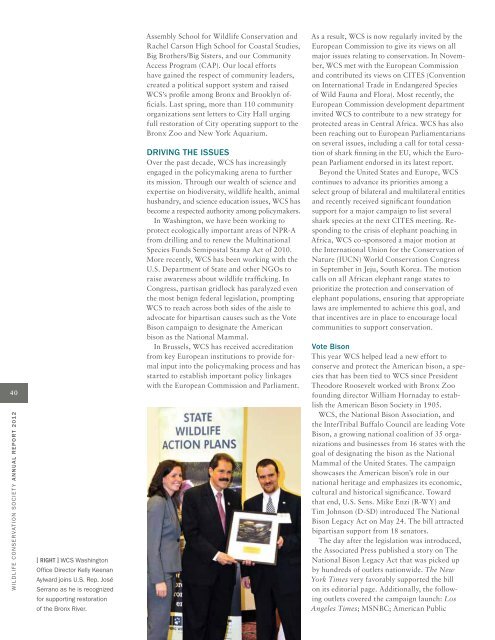
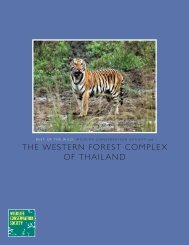
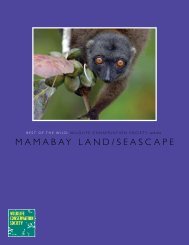
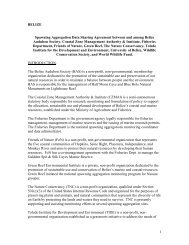
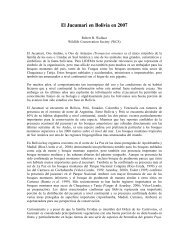
![RaLand / SeaScape [PDF] - Wildlife Conservation Society](https://img.yumpu.com/49974326/1/190x245/raland-seascape-pdf-wildlife-conservation-society.jpg?quality=85)
